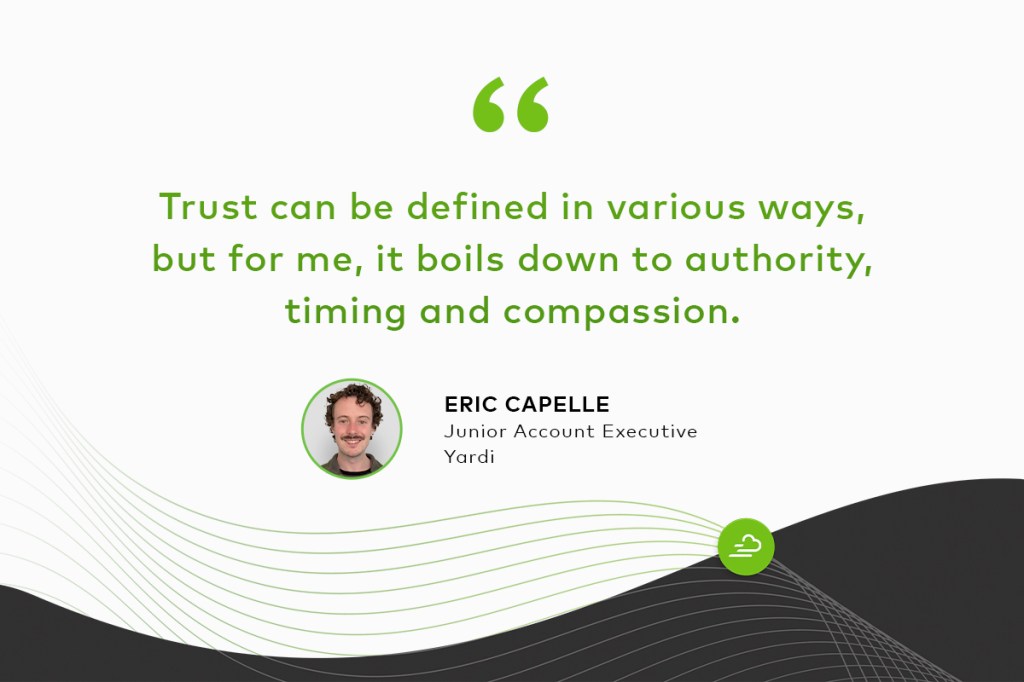
Eric Capelle’s journey with Yardi began sooner than most. He is the son of one of the first people hired to work at the company back in 1985. He brings a unique perspective on the company’s culture, having seen from a young age how Yardi values family and a balanced approach to work. Eric has also managed to stand out in his first year in a big way, demonstrating a natural ability to support our clients and help them grow their businesses. His approach emphasizes trust, understanding and the importance of timing.
This is as much a story about individual achievement as it is about collective success. This interview explores the relationship between Yardi, our clients and our employees, all through the experience of a single standout performer. His story is also the story of our company values.
You have a unique story: Your mom was one of the first people to work at Yardi.
Yes, my mom was the eighth employee at the company, starting when it was located in a small office above a soccer store. She was hired early on and actually just retired a few years back. She began in mailing, then moved to sales alongside Terri Dowen, now senior vice president of sales, and eventually transitioned to quality assurance.
Toward the end of her career, she worked with PHA, among other responsibilities. It’s been quite an experience growing up with the company, attending “bring your kids to work” days, and getting to know the culture and people from a young age. Yardi always had a family-oriented culture with a focus on delivering quality work in a relaxed environment, somewhat retaining that startup vibe. When I first joined the company, I was pleased to find the culture remained consistent with what I remembered from my childhood.
Was it your goal to work at Yardi?
I had no idea I was going to be doing it. This journey was driven by my desire for something stable as well as my interest in sales. What attracted me to Yardi was its culture. We can disconnect at the end of the day without the need to be constantly available. I decided to give it a try here, and it’s been going really well. I really like the culture here.
In your first year, the numbers show you did an outstanding job helping our clients expand their Yardi tech stack. How did you manage this?
My job is to help our clients improve or expand their businesses. Truly, my goal is to be more of a consultant than a salesperson. For example, we have clients who are used to working manually, even with pen and paper, maybe going as far back as 10 or 20 years ago. Each person I speak with has a different level of comfort for the transition to online property management software. For someone who isn’t familiar with their tech, I gradually introduce automations.
My role involves ensuring they clearly understand what we offer, how the transition will go and how they can reach out to us when they’re ready. Recognizing that our clients often have limited staff, it’s crucial to be mindful of their peak seasons and capacities. Our role as consultants sometimes involves advising them to slow down and plan the implementation at a time that makes the most sense for their business.
How did you achieve a high level of success while maintaining a positive work-life balance?
Learning about the product early on and understanding the client journey. Combine that with a dedication to the less exciting, routine tasks that help me stay organized, and you have my formula for success. This work style also helps me maintain a healthy work-life balance.
Another way to put it is that I’m exceptionally good at the so-called boring work. And that’s really what it is. Even as a student, I preferred to spread out my work over time to avoid staying up late the night before. This habit of breaking down tasks into manageable parts has translated well into my sales career. It’s about planning: setting up timelines, scheduling activities and reaching out to clients at the right times. Early on, it’s crucial to do all the necessary planning and be okay with pauses in the process, knowing that maintaining a good relationship means clients will return when they’re ready.
For instance, instead of making generic contact with a client, I focus on specific insights, like noticing they’re not utilizing certain features of our product. I’ll directly address those points. This approach not only saves time but also creates a more meaningful dialogue about how we can help clients with the next step in their journey.
How does trust factor into the client journey?
Trust can be defined in various ways, but for me, it boils down to authority, timing and compassion. Authority means having a deep understanding of what you’re talking about. If you can’t discuss the nuances or explain it to an eight-year-old, then you don’t fully grasp the concept. However, admitting when you don’t know something and promising to find the answer builds trust with clients. They appreciate the honesty.
Another piece is timing. There might be a product I’m excited for a client to use, but if it’s not the right time for them, pushing it doesn’t help. If we revisit the topic in six months when they might be ready, we can establish trust. It shows that you’re thinking about their needs and not just making a sale.
We also need to have compassion when working with clients. That means understanding when a client needs to reschedule will show that you value them as people with lives outside of work. This perspective became even clearer to me after having a baby, as my capacity to worry about every little thing diminished. It’s crucial to plan ahead and not get overly fixated on outcomes. It’s about doing your research, preparing properly and trusting the process until it’s time to engage again. This approach fosters a deeper sense of trust between you and your clients.
Is this what you referred to earlier as being good at the boring stuff?
Building client relationships is the fun part. Each situation is unique, which adds an element of unpredictability and fun to every call. You never know what changes have occurred since the last interaction. What clients really value is knowing that we can support them and help them achieve their goals more quickly than they anticipated. This fosters a healthy, long-term partnership rather than a transactional relationship, and it’s the most rewarding part of my job.
What would you say is the most popular product or service that clients add as they grow?
The most common upgrade among our clients is moving from Yardi Breeze to Yardi Breeze Premier. Initially, they start with Breeze, which serves as our out-of-the-box property management software. However, as their business grows and their needs become more complex, they look for more features. For instance, our residential clients really embrace online lease execution, which saves time by allowing the entire move-in journey to be done online.
Have you ever had a negative relationship develop into a positive one?
Many times, and those instances are actually the most fun. Yardi is very good about not overpromising or claiming to offer features that we don’t have. This honesty is crucial, as overpromising is a common reason salespeople get a negative reputation. On the other hand, in the past year alone, I’ve had at least two or three clients who were in the middle of implementing a product with another company. They reached out to express dissatisfaction with how things were going with the company and wanted to revisit our offerings.
We never close the door on anyone. In property management, both the clients and software provider are in it for the long haul. Everything I do is meant to build a long-term relationship, understanding that people’s needs evolve over time.
What’s the fastest way to lose a customer?
Lying. The ability to say I don’t know is really the greatest toolset. If I say I know how something works when I really don’t, that destroys my credibility and authority. It reflects poorly on the company too. Even if it’s something small or lying by omission, that can ruin a relationship.
On the other hand, what excites our clients about working with Yardi?
Honestly, it’s just using the product. They love our support team so much. The free live chat tool is one of the most popular support features we offer. That’s not something you find with other property management software providers, and we include it as a standard offering. Our clients like that we’re able to respond immediately in most cases. We don’t tend to backtrack on price or functionality, which is not the norm in this industry.
What’s something else we do that isn’t normal for the industry?
For one, we got rid of ACH fees. That’s not the case everywhere. We don’t tend to increase prices, and in fact, we have been known to reduce our price to help our clients manage rising costs across the industry. I mentioned the live chat, which matters because our clients can talk to a real person without navigating past a bot. These things make a huge difference.
Do you ever have non-sales-related interactions with clients?
Oh, all the time. I’ve had the pleasure of working with clients in the Southeast for the past year. Southern culture is all about family, so we often talk about that part of our lives. On the other hand, my Miami clients like to keep things moving, and that’s okay too.
What do you think explains Yardi’s longevity as a company?
I think it comes down to three things. First, we’re a privately held company with stable, consistent leadership over many years. Our top executives have been with the company for 15, 20 or even 25 years, and we don’t have external board members or investors dictating short-term profit goals. This allows us to make strategic decisions, such investing in new technology without the pressure of quarterly earnings reports. Employees here appreciate the consistency and growth potential of the company.
Second, Yardi avoids a burnout culture. In an industry where sales and tech roles often come with high stress and long hours, Yardi strikes a balance between taking care of its employees and being a tech innovator. We embrace cutting-edge technology, including AI. We lead the industry in innovation like a new tech company, but we also maintain a work-life balance that a mature, family-owned company can offer. We do our work and go home to focus on our personal lives.
Last, internal promotions play a significant role in Yardi’s success. The company’s ability to nurture talent from within is exceptional. It’s shocking, even, because you don’t see people in the sales industry advancing from entry-level to senior-level positions in the course of a few years. High performers are recognized here. This culture of promoting from within ensures that we invest in our people and help them grow into the roles that best suit their skills and ambitions. This approach not only fills gaps effectively but also builds a strong, committed team that contributes to the company’s longstanding success.
What keeps you motivated on a daily basis?
For me, motivation comes from two main sources. First, obviously, is providing for my family. The other source of motivation is my desire to grow and learn. I thrive on being challenged. The moment I cease to feel challenged is when I start to feel bored, and that’s my cue to seek out new challenges and opportunities for growth. I’ve been lucky enough at Yardi to be presented with new challenges pretty consistently. These opportunities have helped me grow and expand my capabilities. It’s work, but it’s really fun.



